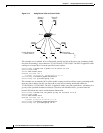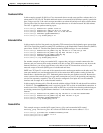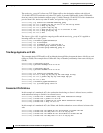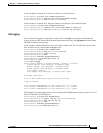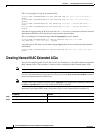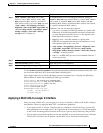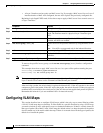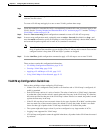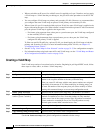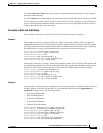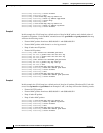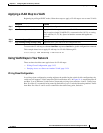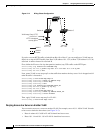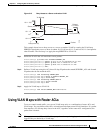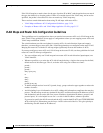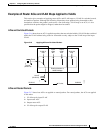
31-30
Cisco ME 3400 Ethernet Access Switch Software Configuration Guide
OL-9639-06
Chapter 31 Configuring Network Security with ACLs
Configuring VLAN Maps
• When a switch has an IP access list or MAC access list applied to a Layer 2 interface, and you apply
a VLAN map to a VLAN that the port belongs to, the port ACL takes precedence over the VLAN
map.
• You can configure VLAN maps on primary and secondary VLANs. However, we recommend that
you configure the same VLAN maps on private-VLAN primary and secondary VLANs.
• When a frame is Layer-2 forwarded within a private VLAN, the same VLAN map is applied at the
ingress side and at the egress side. When a frame is routed from inside a private VLAN to an external
port, the private-VLAN map is applied at the ingress side.
–
For frames going upstream from a host port to a promiscuous port, the VLAN map configured
on the secondary VLAN is applied.
–
For frames going downstream from a promiscuous port to a host port, the VLAN map
configured on the primary VLAN is applied.
To filter out specific IP traffic for a private VLAN, you should apply the VLAN map to both the
primary and secondary VLANs. For more information about private VLANs, see
Chapter 12,
“Configuring Private VLANs.”
• See the “Using VLAN Maps in Your Network” section on page 31-33 for configuration examples.
• For information about using both router ACLs and VLAN maps, see the “VLAN Maps and Router
ACL Configuration Guidelines” section on page 31-36.
Creating a VLAN Map
Each VLAN map consists of an ordered series of entries. Beginning in privileged EXEC mode, follow
these steps to create, add to, or delete a VLAN map entry:
Use the no vlan access-map name global configuration command to delete a map.
Command Purpose
Step 1
configure terminal Enter global configuration mode.
Step 2
vlan access-map name [number] Create a VLAN map, and give it a name and (optionally) a number. The
number is the sequence number of the entry within the map.
When you create VLAN maps with the same name, numbers are assigned
sequentially in increments of 10. When modifying or deleting maps, you
can enter the number of the map entry that you want to modify or delete.
Entering this command changes to access-map configuration mode.
Step 3
action {drop | forward} (Optional) Set the action for the map entry. The default is to forward.
Step 4
match {ip | mac} address {name |
number} [name | number]
Match the packet (using either the IP or MAC address) against one or more
standard or extended access lists. Note that packets are only matched
against access lists of the correct protocol type. IP packets are matched
against standard or extended IP access lists. Non-IP packets are only
matched against named MAC extended access lists.
Step 5
end Return to global configuration mode.
Step 6
show running-config Display the access list configuration.
Step 7
copy running-config startup-config (Optional) Save your entries in the configuration file.



